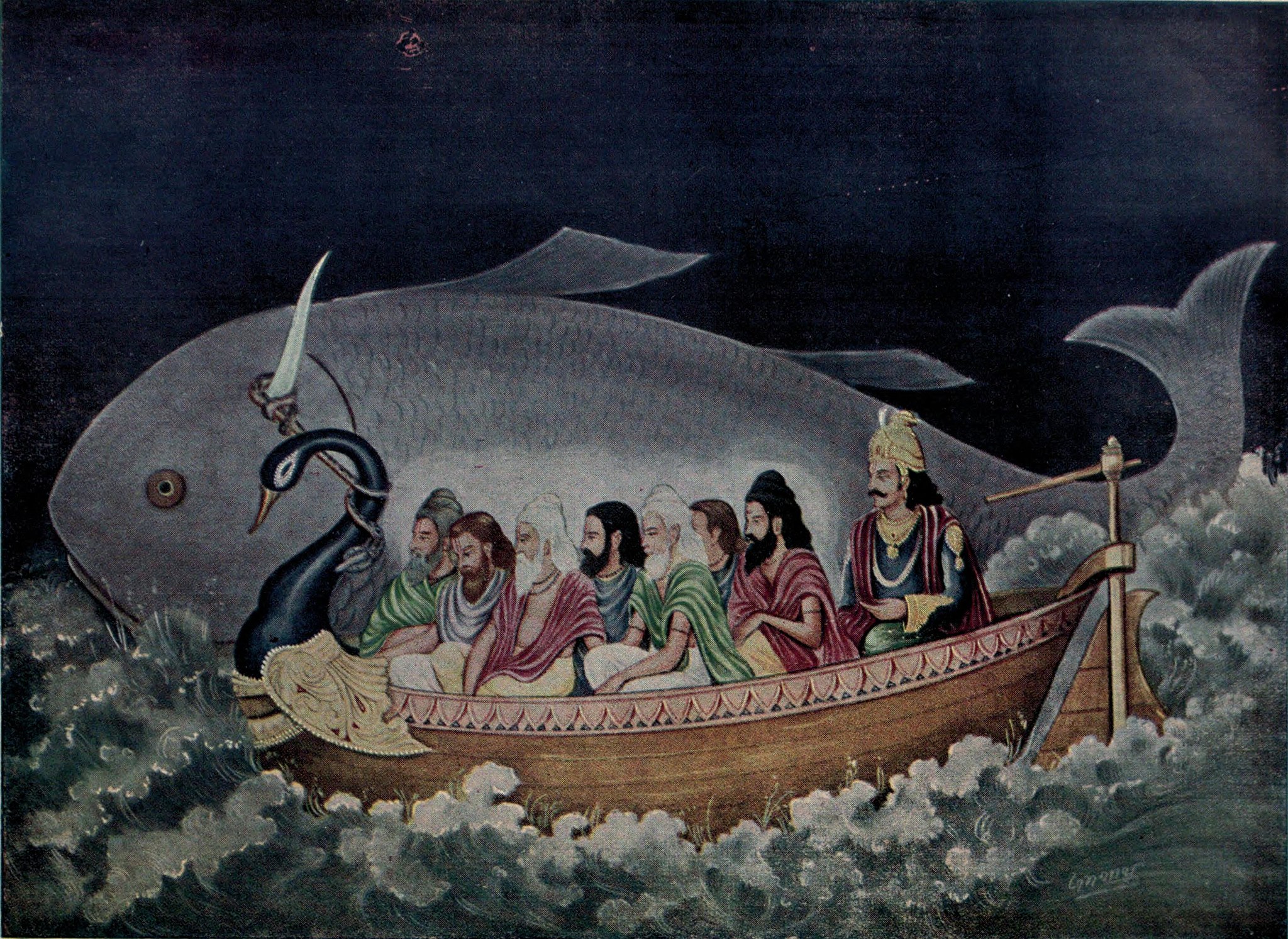
Med Julius Eggelings oversættelse (se online); sanskrit tekst fra GRETIL.
1.8.1.1 Mánave ha vaí prātár avanégyam udakám ā́ jahrur yáthedáṁ pāṇíbhyām avanéjanāyāháranty evaṁ tásyāvanénijānasya mátsyaḥ pāṇī́ ā́ pede
In the morning they brought to Manu 1 water for washing, just as now also they (are wont to) bring (water) for washing the hands. When he was washing himself, a fish came into his hands.
prātár (adv.) ‘tidligt om morgenen’
avanegya- adj. a-st. ‘til at vaske med’
udaka– n. a-st. ‘vand’
hṛ- ‘bringe, tage’ + ā ‘bringe til (nogen)’
yáthā adv. ‘ligesom’
evam (i tidligere tekster eva) adv. ‘således’
idám adv. ‘her, nu’
avanéjana- n. a-st. ‘afvaskning’
nij- ‘at vaske sig’ + ava ‘af. væk, ned’
Her intensivt, medialt participium
matsya– (m) ‘fisk’
pāṇí- m- i-st. ‘hånd’
pad– ‘falde’ + ā ‘falde ned i’
8.1.2. sá hāsmai vā́cam uvāda ⎪bibhṛhí mā pārayiṣyā́mi tvéti kásmān mā pā́rayiṣyasī́ty aughá imāḥ sárvāḥ prajā́ nirvoḍhā tátas tvā pārayitāsmī́ti káthaṁ te bhṛ́tir íti
It spake to him the word, ‘Rear me, I will save thee!’ ‘Wherefrom wilt thou save me?’ ‘A flood will carry away all these creatures 2: from that I will save thee!’ ‘How am I to rear thee?’
pṛ- ‘frelse’
kasmāt ‘hvorfra, hvordan’
augha– m. a-st. ‘flodbølge’
prajā- f. ā-st. ‘skabning’
vah- ‘føre’ + niṣ ‘bort’
8.1.3. sá hovāca⎪yā́vad vaí kṣullakā bhávāmo bahvī vaí nastā́vannāṣṭrā́ bhavaty uta mátsya eva mátsyaṁ gilati⎪kumbhyāṁ mā́gre bibharāsi sá yadā tā́mativárdhā átha karṣū́ṁ khātvā tásyāṁ mā bibharāsi sa yádā tā́m ativárdhā átha mā samudrám abhyáva harāsi tárhi vā́ atināṣṭró bhavitāsmī́ti⎪
It said, ‘As long as we are small, there is great destruction for us: fish devours fish. Thou wilt first keep me in a jar. When I outgrow that, thou wilt dig a pit and keep me in it. When I outgrow that, thou wilt take me down to the sea, for then I shall be beyond destruction.’
kṣullaka– adj. a-st. ‘lille’
nāṣṭrā- f. ā-st. ‘fare’
uta konj. ‘og’
gḷ- ‘æde’
kumbhī-(f) krukke
vṛdh- ‘vokse’ + ati ‘ud af’
karṣū– f. ū-st. grøft
khan- ‘grave’
abhi + akk. ‘til’
samudrá- (n) hav
hṛ- ‘bringe, tage’ + ava ‘ned’
tárhi adv. ‘der’
ati– ‘ud over, uden for’
śaśvat ha straks
8.1.4. śáśvaddha jhaṣá āsa⎪sá hi jyéṣṭhaṁ várdhate ’thetithīṁ sámāṁ tád aughá āgantā tán mā nā́vam upakalpyópāsāsai sá augha útthite nā́vam ā́padyāsai tátas[t]vā pārayitāsmī́ti⎪
It soon became a ghasha (a large fish); for that grows largest (of all fish) 3. Thereupon it said, ‘In such and such a year that flood will come. Thoup. 217 shalt then attend to me (i.e. to my advice) by preparing a ship 1; and when the flood has risen thou shalt enter into the ship, and I will save thee from it.’
jhaṣa– (m) havuhyre, kæmpefisk
ithitha-, f. –ī ‘det og det’
augha- m. a-st. ‘flodbølge’
gam– ‘komme’ + ā
nauḥ f. ‘skib’
kḷp– ‘forberede’ + upa
ās- ‘sidde’ + upa ‘afvente’
sthā- + ud ‘rejse sig’
pad- + ā ‘stige op i’
8.1.5. tám eváṁ bhṛtvā́ samudrám abhy áva jahāra⎪sá yatithīṁ tat sámāṁ parididéśa tatithīṁ sámāṁ nā́vam upakálpyopāsā́ṁ cakre⎪sá augha útthite nā́vam ā́pede taṁ sa mátsya upanyā́ pupluve tásya śṛ́ṇge nāvaḥ pā́śaṁ práti mumoca ténaitam úttaraṁ girim ábhi [ati?] dudrāva⎪
After he had reared it in this way, he took it down to the sea. And in the same year which the fish had indicated to him, he attended to (the advice of the fish) by preparing a ship; and when the flood had risen, he entered into the ship. The fish then swam up to him, and to its horn he tied the rope of the ship, and by that means he 2 passed swiftly up to yonder northern mountain.
yatitha– … tatitha- …der wievielte … der sovielte
diś- + pari angiver
plu– + upanya svømme hen til
śṛṇga– n. a-st. ‘horn’
pāśa– m. a-st. ‘reb’
muc- + prati ‘binde fast’
uttara- adj. a-st. ‘nordlig’
giri– m. a-st. ‘bjerg’
dru- + abhi ‘skynde sig hen til’
